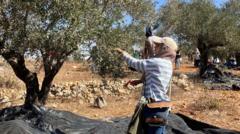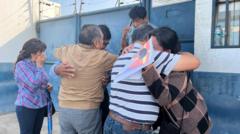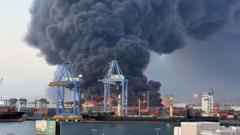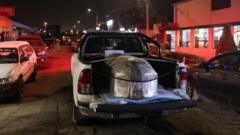Amid increasing violence and restrictions, Palestinian farmers are struggling to harvest olives, a vital part of their economy and cultural identity. Recent incidents, including the shooting of Hanan Abu Salameh by an Israeli soldier and attacks by settlers, exemplify the precarious situation faced by these communities, despite attempts at oversight from international activists and accompanying support.
Olive Harvest Crisis: Palestinian Farmers Face Violence and Restrictions

Olive Harvest Crisis: Palestinian Farmers Face Violence and Restrictions
The olive harvest in the occupied West Bank is increasingly threatened by violence from Israeli settlers, with recent incidents highlighting the growing tensions and challenges faced by Palestinian farmers.
As the olive harvest unfolds in the occupied West Bank, tensions are soaring as Palestinian farmers face significant challenges. One poignant incident involved Hanan Abu Salameh, a 59-year-old mother of seven, who was shot by an Israeli soldier while gathering olives near her family's land in Faqqua. Despite having coordinated their harvest with the Israel Defense Forces (IDF), her family was met with violence as soldiers opened fire, leaving them in despair over the lack of accountability for such actions.
The situation surrounding olive harvesting is becoming increasingly perilous, with many Palestinians reporting organized attacks by Israeli settlers. These attacks not only threaten the harvest but also serve to intimidate farmers. Omar Tanatara, a Palestinian farmer from Umm Safa, recounted his experience of the previous year's harvest being sabotaged by the Israeli military, when soldiers overturned their gathered olives and forced them to leave their fields. Such actions underline the increasing difficulties faced by farmers, who are often met with violence or destruction of their crops.
International observers, such as Israeli peace activist Zuraya Hadad, have expressed frustration and fear as they attempt to assist Palestinian farmers. Hadad was assaulted while accompanying villagers during the harvest, illustrating the heightened risks even for those trying to support the farmers' efforts. She noted that the presence of international activists does not guarantee protection, raising serious concerns about security in these olive groves.
The olive industry, which significantly contributes to the Palestinian economy, is under severe threat. The UN reports that over 96,000 dunums of olive groves in the West Bank remain uncultivated due to Israeli restrictions. With the olive harvest valued at over $70 million in a good year, the ongoing violence and challenges may lead to further economic despair for agricultural communities.
Abd al-Rahman Khalifa, a factory owner, highlighted the implications of violence on profitability, explaining that less income from olive harvesting correlates to fewer opportunities for local farmers. This relationship is vital to the Palestinian economy, which heavily relies on olive cultivation for sustenance.
Adding to the complexity of the situation, far-right Israeli officials, such as national security minister Itamar Ben-Gvir, have been accused of encouraging violence against Palestinian farmers and undermining their right to cultivate their land. The coexistence of illegal settler outposts near Palestinian lands has only intensified fears among farmers, who depend on olives to maintain their livelihoods and cultural connection to their land.
As farmers in places like Umm Safa contend with these threats, they still hope for a fruitful harvest. The olive tree, a symbol of resilience and heritage, continues to stand at the heart of this ongoing struggle, representing both the economic and spiritual significance for the Palestinian people amidst a backdrop of conflict.





















